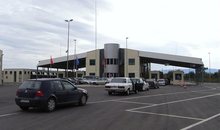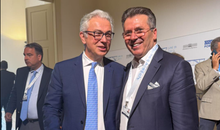
 Flash News
Flash News
VIDEO/ Gang fight in Greece revealed, 12 arrested, including Albanians
He lived on money with usury and threatened people, the deputy commissioner in Elbasan was arrested (NAME)
NAME/ Drugs and illegal weapons, young man arrested in Durrës, accomplice under investigation
Fire alarm in the country, 6 fires still active, what is the situation so far?
Convicted in Switzerland for drug trafficking, arrested in Qafë Thanë Macedonian (EMRI)

Ilir Gëdeshi and Russell King have been engaged in demographic studies for decades, mainly focusing on emigration and returns in both the general population and brain drain.
For Mr. King, a professor at Sussex University in Britain, Albania has become a unique case study in the phenomenon of mass emigration.
After decades of isolation, Albanians were swept up in an unstoppable wave of emigration, driven by the economic crisis, lack of perspective, and the desire for a better life.
This has made our country an ideal "laboratory" for migration researchers, who have the opportunity to observe various forms such as economic migration through asylum, "brain drain", marital migration, partial returns and internal movements towards urban centers.
Mr. Gëdeshi said that the prevailing causes of emigration currently remain mainly economic, poverty, unemployment and higher salaries abroad.
But cultural and social factors such as lack of trust in institutions, corruption and the desire for "a normal life" are also increasingly influencing.
The profiles of immigrants are diverse, from low-skilled workers, to educated professionals, students, and asylum seekers.
The percentage of "brain drain" has increased significantly, around 40% of emigration in the period 2012–2019 consisted of young graduates.
Researchers claim that Albanian emigration has evolved from manual workers towards more qualified and younger generations. Germany, the US and Britain have become the most preferred destinations, instead of Italy and Greece.
The desire for education and training abroad has also increased, especially among young people aged 18–40.
From one perspective, researchers have noted that in some way, emigration reduces social tensions and unemployment and increases foreign exchange reserves through remittances.
But according to them, the negative effects are many times greater. Emigration is contributing to the deepening of regional and social inequalities.
Only a small proportion of migrants return to Albania. Returns are more common in the case of rejected asylum seekers or those affected by crises in host countries.
Meanwhile, most living abroad maintain strong ties to Albania, but do not plan to return due to the lack of favorable conditions.
Surveys show that only 17% of the scientific diaspora and 15% of doctors want to return. Most cite the lack of political and economic stability, corruption, lack of meritocracy, and poor infrastructure as obstacles.
Returnees often feel like strangers in their own country. Researchers have noted that Albania is perceived as more individualistic and less communitarian than before.
Returnees face corruption, bureaucracy, informality, and challenges in building businesses, while rural areas are emptied and Tirana is overwhelmed by construction.
Mr. Gëdeshi said that solutions require deep reforms and targeted strategies.
Among the most important are increasing the economic level and quality of work, increasing trust in institutions, and fighting corruption.
They recommend active policies for the return of skilled workers, creating specialized databases that enable connections to the domestic market.
Researchers believe that the prospect of a massive return remains low as long as real reforms are lacking and prices rise faster than wages.
If Albania aims to move from exodus to return, this change requires more than just politics, it requires regained faith in the country's future./Monitor
Latest news


Turkey increases political influence in the Western Balkans
2025-07-06 15:48:14
Dalai Lama turns 90 amid global adoration
2025-07-06 15:27:46
Tax for singles or those who do not leave
2025-07-06 15:04:00
Earth farther from the Sun, but scorching heat! Why is this happening?
2025-07-06 14:51:26
Fire at the Incinerator/ Gjokutaj Ironizes: PS should name the city Qelbasan!
2025-07-06 14:35:10
The youth exodus and Rama's political carnivals!
2025-07-06 14:16:04
VIDEO/ Gang fight in Greece revealed, 12 arrested, including Albanians
2025-07-06 13:47:52

Albania in fire, Rama at sea (VIDEO)
2025-07-06 13:04:45
New tactic revealed! France uses "Jet Ski" to stop migrants heading to Britain
2025-07-06 12:41:13
Balluku is becoming "Veliaj 2"
2025-07-06 12:16:11




Why shouldn't we take cold showers during a heat wave?
2025-07-06 10:39:16
Fire alarm in the country, 6 fires still active, what is the situation so far?
2025-07-06 10:10:04

Vietnam and the US sign a customs agreement
2025-07-06 09:39:42

2-year-old girl drowns in family pool in Kosovo
2025-07-06 09:11:18
Albania, as a migration laboratory
2025-07-06 08:54:18
Today's horoscope, what the stars have predicted for each sign
2025-07-06 08:37:51

Temperatures up to 40 degrees! Weather forecast for today
2025-07-06 08:00:35
Morning Post/ In 2 lines: What mattered yesterday in Albania
2025-07-06 07:45:21
When 90 minutes awaken decades of history: Albania – Serbia, beyond football
2025-07-05 21:51:55
Not only the body, swimming also helps the brain
2025-07-05 21:02:49
"Be careful with the water", Alimehmeti warns about the health risks of summer
2025-07-05 20:39:10
PSG beats Bayern Munich 2-0, advances to Club World Cup semifinals
2025-07-05 20:19:38

Two vehicles collide on the Elbasan-Peqin axis, drivers injured
2025-07-05 19:26:29

What does Zelenskyy have more than Zegjineja?
2025-07-05 18:45:26

Fiscal peace, but at a cost
2025-07-05 18:00:10
'Bankers' tax evasion, Chinese CEO and former director jailed
2025-07-05 17:39:21
Kyle Walker joins English club on two-year deal
2025-07-05 17:20:24
Two cars collide on the Saranda-Delvina axis, 4 injured
2025-07-05 17:05:29
Touching gesture! Liverpool will pay Jota's family's salary until 2027
2025-07-05 16:45:18
The zodiac signs that cheat most often
2025-07-05 16:25:53

"I asked for the dismissals", Dredha tries to soften Rama's 'blow' in Vlora
2025-07-05 15:48:49
Bomb threat in Parliament, prosecutor: It was a lie
2025-07-05 15:22:28

Bardhi: The recount revealed how greedy Zeqine Balluku is in stealing
2025-07-05 14:44:29
Knife wound on the secondary road Tirana-Durrës, perpetrator sought
2025-07-05 14:37:54
Tears and pain, Diogo Jota is escorted to his final home
2025-07-05 14:21:34
Success starts with yourself! Simple ways to invest in personal development
2025-07-05 13:58:50
Unlicensed firearms found in apartment, 50-year-old arrested in Lushnje
2025-07-05 13:43:11

Tirana Court remands Skerdi Sina to prison
2025-07-05 12:59:34
Cocaine laboratory in Greece, here are the Albanians arrested and wanted
2025-07-05 12:40:16
Directed Justice/Vangjeli: SPAK does not investigate any scandal involving Rama
2025-07-05 12:22:03

Bomb alert, Police remove MPs and media from Kosovo Parliament building
2025-07-05 11:48:16
"The will of the people" and the irony of ordered resignations
2025-07-05 11:32:05
Summer drowning risk: How to enjoy the water without risking your life
2025-07-05 11:20:27
Fire situation in the country, 16 fires reported in 24 hours, 4 still active
2025-07-05 11:07:04
Car hits pedestrian at white lines, injured in serious condition in Vlora
2025-07-05 10:59:58
Mosquito-borne diseases are a growing problem in Europe
2025-07-05 10:44:13



One of Sweden's most dangerous and wanted criminals arrested in Turkey
2025-07-05 09:38:29
Foreign exchange/ How much foreign currencies are bought and sold today
2025-07-05 09:18:38

"Don't be influenced by the opinions of others", today's horoscope
2025-07-05 08:40:50

Morning Post/ In 2 lines: What mattered yesterday in Albania
2025-07-05 08:02:07

Trump says he's ready to raise tariffs to 70% on some countries
2025-07-04 22:35:52
Tre shenjat e zodiakut që do ‘pasurohen’ në Korrik
2025-07-04 22:05:09
Gaza War: Hamas Accepts US Proposal for 60-Day Ceasefire
2025-07-04 21:50:10
Autocracy in Albania, Fuga: Governance has gotten out of control
2025-07-04 21:40:51
Meta: Agriculture on credit, the new fraud!
2025-07-04 21:26:39




Vote recount in Durrës ends without changes
2025-07-04 20:12:54
Gas station explodes in Rome, 25 injured (VIDEO)
2025-07-04 20:00:20

These afternoon habits often sabotage weight loss
2025-07-04 19:39:28
Former Arsenal player Thomas Partey accused of rape
2025-07-04 19:24:21
Shepherd disappears without a trace in Delvina
2025-07-04 19:14:31

Bardho gave Zegjine's mandate/Braho: Unfair! It violates the electoral system
2025-07-04 19:01:08


Rapid developments in the Sultanates!
2025-07-04 18:00:06



Italy tightens rules for skateboard traffic
2025-07-04 17:20:18

Unusual for the time, dense fog covers the coast of Vlora
2025-07-04 16:48:01

